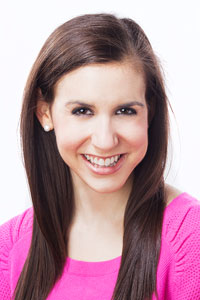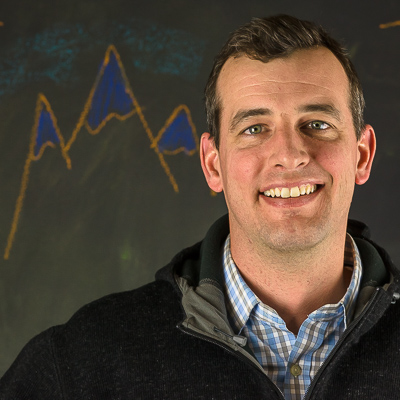The Lab’s profiles are Q&As with smart people who are shaping the future of media. Follow the series.
It seems strange to say now, but a month or two back Callie Schweitzer wasn’t anywhere on my radar. Her name first appeared in my inbox along with a compliment and a bold suggestion for Knight Lab’s Q&A series. And then, suddenly, she was everywhere. She moved from VOX Media to her new gig as director of digital innovation at TIME. Then she crafted a series of insightful posts on the need for authenticity online, how we find news, and a touching, personal account of how she became a journalist. Oh, and she made the Forbes 30-Under-30 list. She's a smart, savvy journalist who understands modern publishing in a way that many do not. She's a 2011 USC Annenberg grad and was previously deputy publisher at Talking Points Memo.
You recently took a job as the first ever Director of Digital Innovation at TIME — how did this come about?

I've always been a big fan of the TIME brand and its journalism, and news and politics have long been my passion. TIME already has a well-established foundation in the digital and social world and is undertaking a major relaunch this fall to take things to the next level, so when the opportunity to help TIME grow and prosper in this area and with new generations presented itself, I knew it was my dream job. I'd interned at People magazine for two years in college, so getting to walk back into the Time Inc. building feels like going home.
At TIME I'll be working on increasing traffic and audience engagement in addition to overseeing the social media team, newsletters and a variety of other new product initiatives and content partnerships.
Most recently you've been the marketing director at VOX media, but you're headed to the editorial side at TIME. I think purists would say your either a journalist or a marketer, but not both. How would you respond to that?
Publication is no longer the last step in the publishing process — promotion, expansion and marketing of the content is. The best journalists know how to "market" their content to the right audiences and find new readers in the process. I've always said I am a journalist, even when I had the word "marketing" in my title. Every publication should have someone who is finding new communities of readers and expanding the brand's reach. I call this "audience hacking."Publication is no longer the last step in the publishing process — promotion, expansion and marketing of the content is.
That’s a really interesting idea. In an ideal world, who is responsible for finding new audiences?
Ideally, everyone at a news organization would be focused on this kind of outreach and growth for the publication, but since that's probably a tall order, I think it's really important to staff up an audience outreach and development team. I think the evolution of the social media editor is an audience development manager, who's in charge of overseeing social media in addition to finding new audiences elsewhere. This means actively promoting and marketing a publication's content to audiences that may be interested or affected.
I'm driven by the idea of bringing people “news they don't know they need.” The headline of a piece isn't always going to sell it to the widest audience. In fact, it may even discourage people from reading. But thinking about the story's various assets and figuring out how to package it for as many different people as possible is how you succeed, which is another reason I'm excited about this new role at TIME — they really embrace this approach.
It's funny to me when people disparage the role of the person overseeing social media strategy because that person oversees the most public facing part of the organization's brand: its presence in the social network sphere. The importance of this audience development role is that this person is showing new audiences that the publication's content is relevant enough to them that they can and should be visiting over and over.
You're known as a great networker. Should journalists work harder to network? What are the best ways to go about it?
I've never seen networking as "work" or part of my job, and I think the second you do is the second it becomes that stereotypical buzzword everyone hates. The best thing you can do when you meet new people is be yourself and be genuine. I try to meet someone new every single day because I am genuinely curious about how other people work and what they're working on — regardless of if they're in the media business or not. I take it as a huge compliment when people tell me I'm just like my Twitter feed. I try to be 100% real there, and I think people appreciate that.
You wrote a well-received piece on Medium that called for all of us to be more authentic online. But there’s a time and a place to share most things and plenty of people who have a distinct, one-tone online persona are successful — is it really that important to strive for authenticity?
Ultimately, it's a personal decision. I've found it really rewarding to be genuine, and I've found that being myself on Twitter has been key to translating great online relationships into great offline ones. You feel like you already know someone when you meet them. I love that sense of familiarity. But putting yourself out there in any situation is definitely something that can make you feel vulnerable — and I've certainly felt that — it just comes with the territory.
What excites you most about journalism/media in 2013?
The opportunities are endless. The new platforms and technology we have available to us are the most exciting things in the world to me. These tools enhance our ability to tell great stories and give readers and content creators more access to one another, which I've always believed is a good thing. From Twitter to YouTube to Vine and Google Glass, the barrier to entry for participatory media and storytelling has never been lower, and I think that's a good thing.
Whenever someone says, "media is dying!" I'm the first person to speak up about how it's not. I have nothing but hope and optimism for this industry, and I see better journalism that's being enabled by the internet every single day.
How did you get your start in media?
David O. Russell (Silver Linings Playbook, The Fighter, I Heart Huckabees) was an alumnus of my New York public school, and the high school newspaper editor assigned me to interview him. When I finally got Russell on the phone, I jokingly invited him to come by the school and visit us. Much to my surprise, he took me up on it. I spent the day with him, touring around the school and talking with him. I had my first front-page story, and the rest is history.
Any apprehension about heading to a company with strong legacy roots after being at a start-up?
None.
When did you decide to become a media professional?
The David O. Russell experience really made me want to be a reporter and a storyteller, but I became interested in building newsrooms and sustainable business models for journalism when I was in college. I went to USC Annenberg at the University of Southern California, and I ran a news website called Neon Tommy, which covered city, state, national and international news, science, sports, arts, entertainment, food, opinion and more.I want to get the greatest quality content into as many hands as possible. I wake up every morning thinking about that.
I was 20 years old running a newsroom of 250 volunteers, and I realized I wanted to be in an environment like this for the rest of my life. I've always been driven by this innate desire to bring people quality journalism. I want to get the greatest quality content into as many hands as possible. I wake up every morning thinking about that.
What do you read religiously?
The New York Times business section's Corner Office column, which runs on Fridays and Sundays. I love reading about leadership and management and how people learn to motivate others. When I was growing up, my dad used to quote Confucius: "Find a job you love and you'll never work a day in your life." I've been lucky enough to feel that way about the jobs I've had since graduating college, and it's my dream to help other people find that same passion and enjoyment at work.
What applications do you have open while you're working?
Chrome, Spotify, TweetDeck, Evernote and Messages.
What could the world use a little more of?
Kindness
What could the world use a little less of?
Olives. I've just never understood the phenomenon.
About the author





